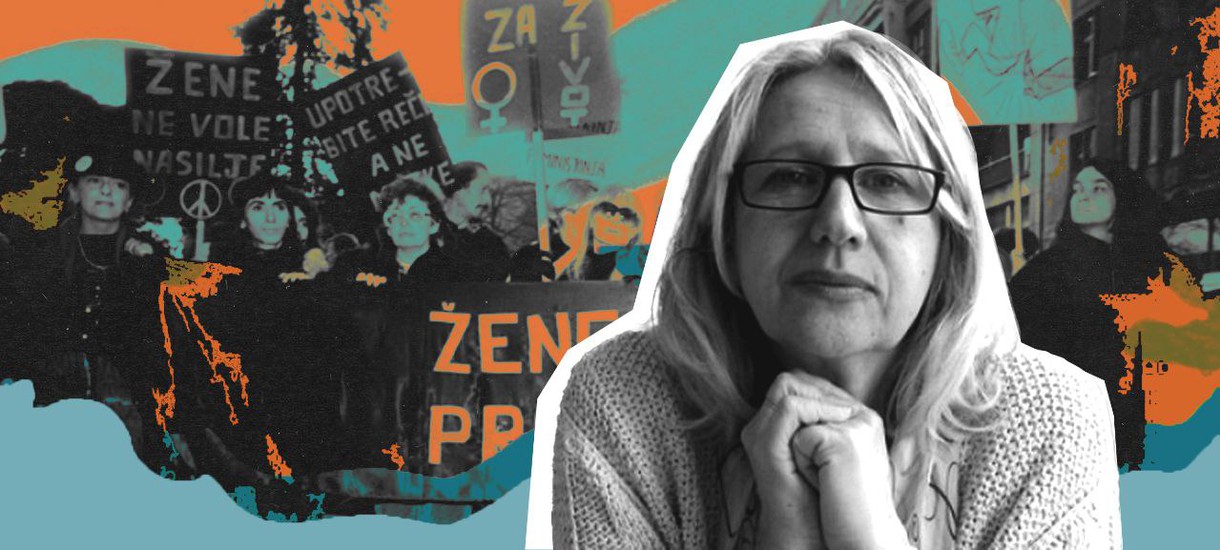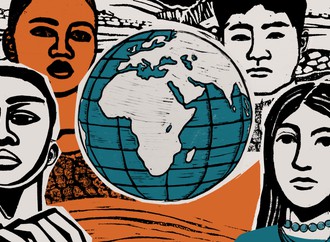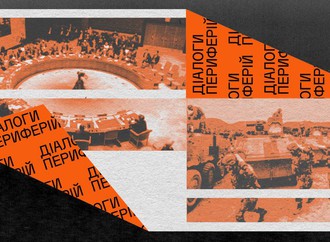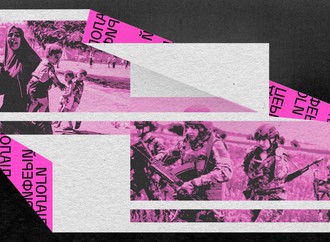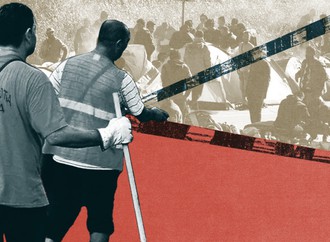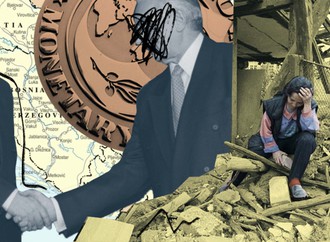Biljana Kašić is a feminist theorist as well as peace and civil activist from Croatia. She is one of the leaders of the Centre for Women’s Studies (Zagreb), the co-founder of many feminist initiatives since the eighties of the twentieth century and engaged feminist at the international level. As a professor at the Department of Sociology at the University of Zadar, she promoted feminist engaged epistemology and critical theory.
This conversation took place last autumn at the ‘Left Horizons’ school, where Biljana was invited to give a lecture on the feminist challenges during and after the war in Croatia. During the lecture and the interview, as well as while chatting with us, Ukrainian activists, she repeatedly emphasised that her goal there was to share her own experience and knowledge about her country and to learn something from us, and under no circumstances explain to us what we should do in Ukraine.
After the interview, we spent some time talking about the Russian invasion, about our everyday lives in Ukraine, and about the challenges that we face as leftists, feminists and just people trying to live during the war. Biljana probably asked me more questions than I’d asked her and took notes while I spoke. It was nice to see how (unlike many of the foreign leftists I’ve met since the invasion) she only wanted to hear about my experience and position, without lecturing me or arguing.
Although Biljana emphasises that her aim is to tell us about Croatia in the first place, I cannot avoid drawing parallels with Ukraine when rereading this interview. Many problems seem alike, and at the same time, there are aspects that make our experiences different. I invite you to reflect on this while reading the interview with researcher and feminist Biljana Kašić.
Olenka: Being a left feminist, can you tell our readers a bit more about your political standing and activism?
Biljana: First, I can say that I am a feminist, with a left orientation, but I’m also a pacifist, for many reasons. I can introduce myself mainly as a postcolonial and decolonial feminist with traces in radical and Marxist feminisms, and also partially in postmodern feminism. Knowing that all those feminisms have a kind of troubles in a certain sense. While, for example, radical feminism in the last decade has been criticized for overlooking other genders and its 'trans' features, focusing above all on the sex/gender identity of women and disregarding intersectionality, postcolonial feminism is sometimes understood as 'trendy' feminism supported by the Western neoliberal academy.
Also, I’ve been an activist for more than four decades within Yugoslavia and also after 1991 — in Croatia. I’ve been teaching in Croatia and worldwide at different universities. In addition as an international activist, I was much more involved in activism within the Global South, including El Taller, an international organisation located in Tunisia which searches for social justice and feminist response to long-term violence such as imperial, racial, gender based, the problems that people, particular women, faced in their local communities. Also, I’ve been doing a lot of work with women from the so-called Third World countries including India.
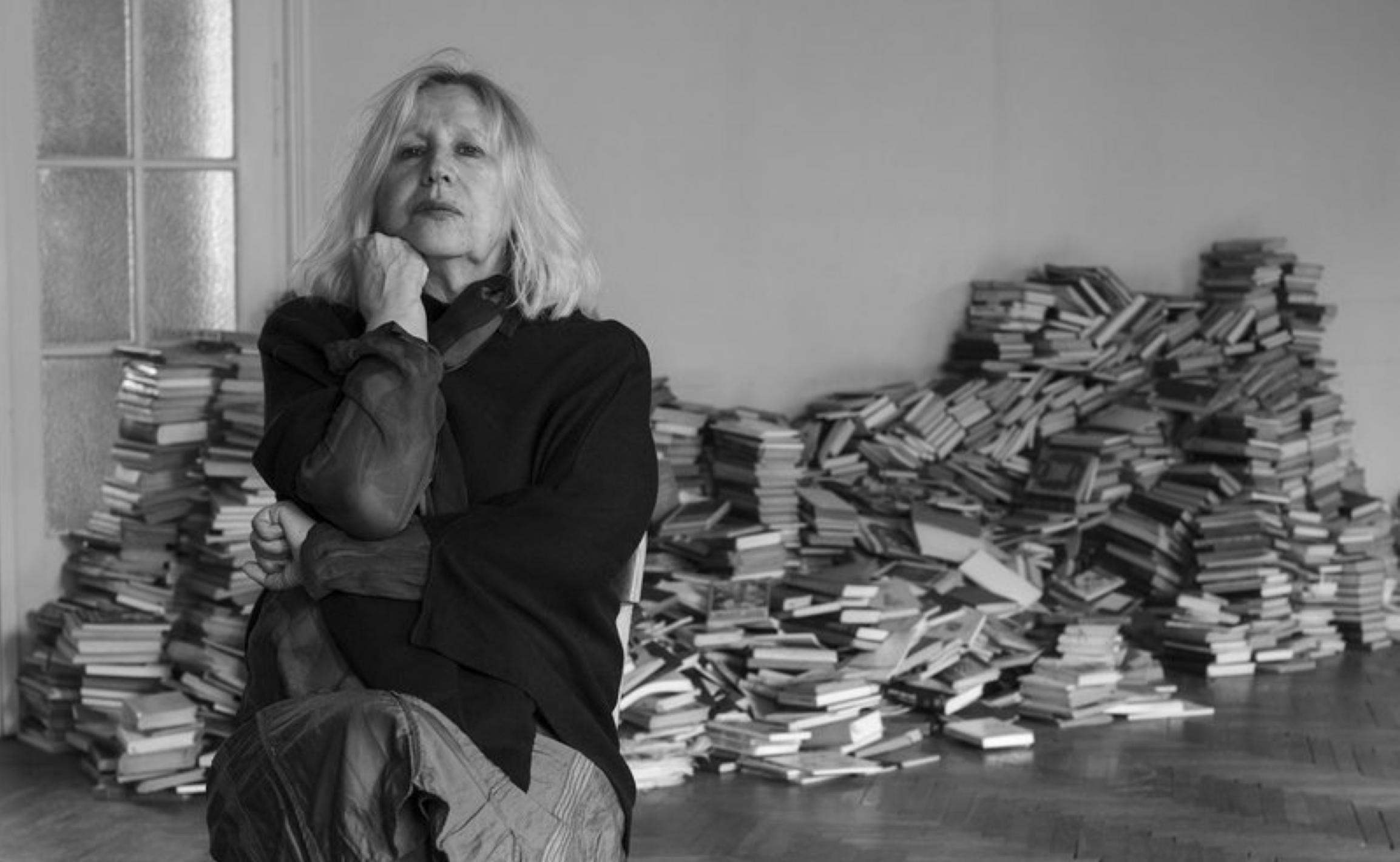
Biljana Kašić
As a researcher, you focus on the feminist movement in Croatia during and after the war. What were the main challenges this movement was reacting to?
At the beginning of the war, along with being shocked and terrified, and feeling despair and also anger, there were many challenges we as feminists dealt with. I’m going to highlight some of them. First: how to pose ourselves as feminists towards war? What is actually our political and ethical position in this regard? It was a very complicated challenge, because it was not only about responding to wartime but also to have a stand about our ethical responsibility. Namely, how could we articulate our feminist position in this regard? The second challenge was related to the question what to do right away, immediately? More precisely, how to define the spheres of our activities; how to create a kind of microspace not only to live with war everyday, but 'to breathe', and to make relation to each other. How to respond to so many social issues concerning wartime? How to support refugees, how to deal with returnees, how to deal with human suffering? The third challenge was how to continue working with our feminist friends beyond the war aggressor/victim paradigm, and despite the different positions we suddenly experienced. In short, how to persist in maintaining our communication, especially with our friends from Serbia and from Kosovo? It's worth mentioning here that we had quite a strong feminist community before the wartime. And the fourth issue is connected with a creation of supportive feminist networks within and beyond Croatia.
In terms of the topics, war rape was the most urgent one we had to deal with. I can say that in 1992 and 1993, thanks to feminists from the region, the international women's community was united around this topic. Rape is a crime against humanity but also a crime against women - that was the premise we insisted on. But, of course, there were many more.
Coming to the post-war time, there were new demands placed before us as feminists. We were thinking about how to integrate the feminist perspectives in the field of reconciliation and justice within the post-war reconstruction. For example, how to deal with war trauma within a national programme is one of these urgent questions. In terms of feminist issues, besides the war rape issue we were thinking how to deal with an increase in domestic violence against women in the light of post-war traumatic syndrome, or what about women’s exclusion from the labour market, or how to articulate feminist agenda to achieve gender inequality. Also, how to deal with our own survival.
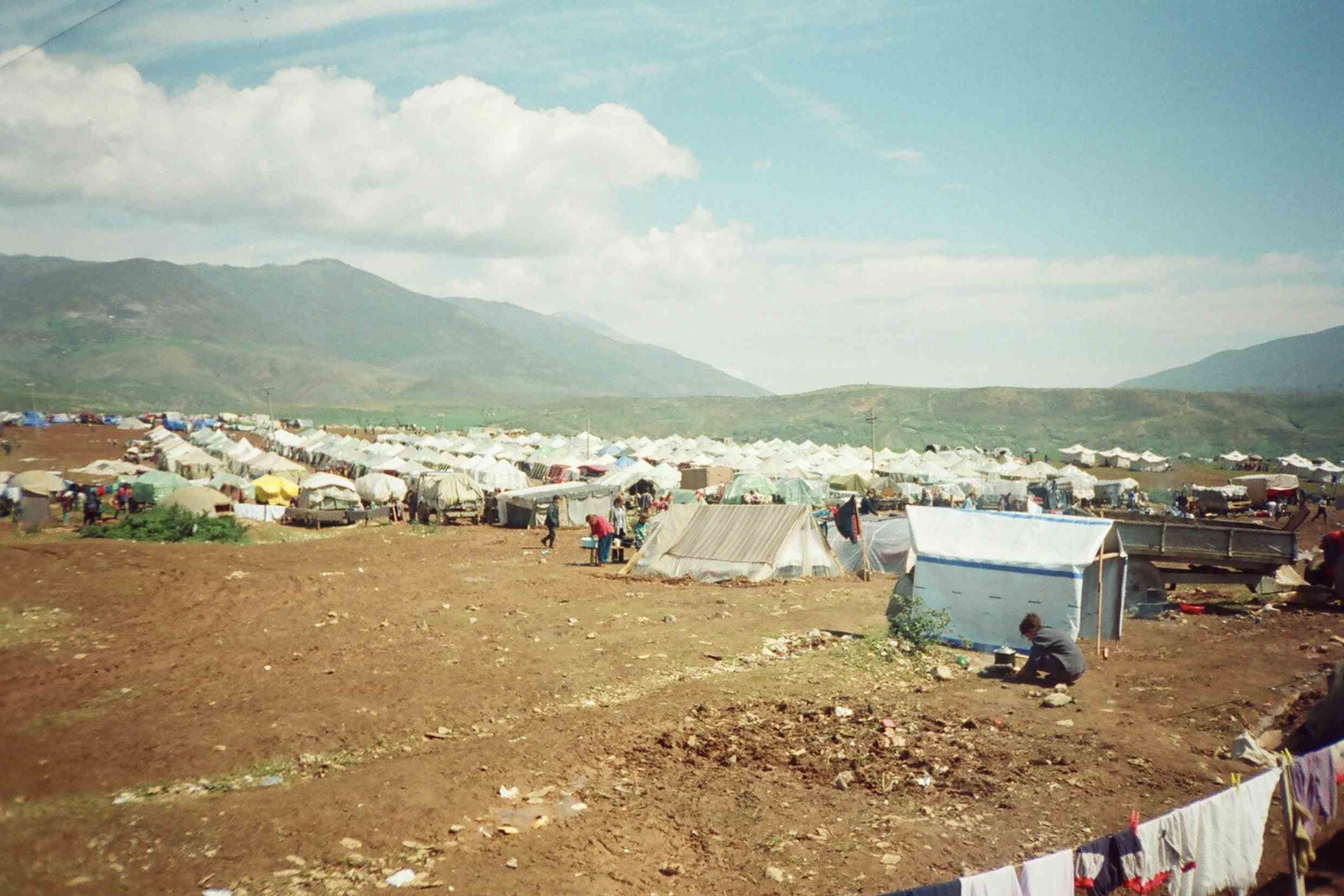
Kosovo refugee camp, 1999. Photo: Wikimedia
In relation to the issue of domestic violence after the war: do you think it may also have to do with these symbolic roles of men as defenders and women as victims? Did the war reinforce those?
Not fully in that sense. There were, of course, these stereotypical positions of women and men during the war that put both genders back into clichéd roles. But, the increase in domestic violence in the post-war time actually happened because of a lot of frustration, unsolved problems and shared anxiety linked to male PTSD syndrome; namely, violence from the battlefield was partially transferred into the domestic sphere, and women became its first victims. Women were not prepared for this 'new' situation since as a society we were not ready to deal with the symptoms of post-traumatic stress disorder (PTSD) and its implications. There was not any psychological support for either war defenders or women as their victims. Also, women didn’t report what happened to them for so many reasons, including the one often justifying behavior of war veterans. However, domestic violence always increases after any war, no matter how we perceive or define it.
We were already talking about feminist activism before the war in the former Yugoslavia. It may be interesting to mention that we set up the first shelter for abused women in 1990. Autonomous Women’s House, located in Zagreb, was the first shelter for abused women at that time not only in Yugoslavia but in the whole eastern region. I remember being a volunteer at the SOS hotline and then the shelter that we got a lot of letters of support from everywhere, particularly from women from Russia, Ukraine, Bulgaria, Romania etc.
So we had a certain experience dealing with domestic, or male violence against women that helped us in supporting women victims afterward.
In retrospect, were there any blind spots in your movement that you can analyse now?
There were a lot of blind spots. First, we couldn’t believe that we would pass through the violent partition of our country, called Yugoslavia at that time. Neither were we thinking that anybody would dare to attack its republics, and multi-ethnic Bosnia and Herzegovina, in particular. We lived in a country with a significant proportion of mixed multi-ethnic families with more or less normal national tensions, but 'pure nation-states' were not conceivable at that time. When the war started – first in Slovenia and then in Croatia in 1991 – although some violent acts were already present in Kosovo – we had no clue why. Although already living at war, we believed that war would not happen later on in Bosnia and Herzegovina.
As feminists and as peace activists at the time, we were fully wrong (laughs). Nobody could prepare you for the war; war is not stamped in our human register. We couldn’t predict it or stop it, we couldn’t perceive the power of national myth and the myth of national sovereignty and the manipulative role they have in war events. It was also kind of a miracle we faced: just in a moment Yugoslav myths were destroyed, new national myths emerged. We, as feminists or Left feminists, came out of the war very exhausted and powerful at the same time, with no trust and much expectations from new, emerging states.
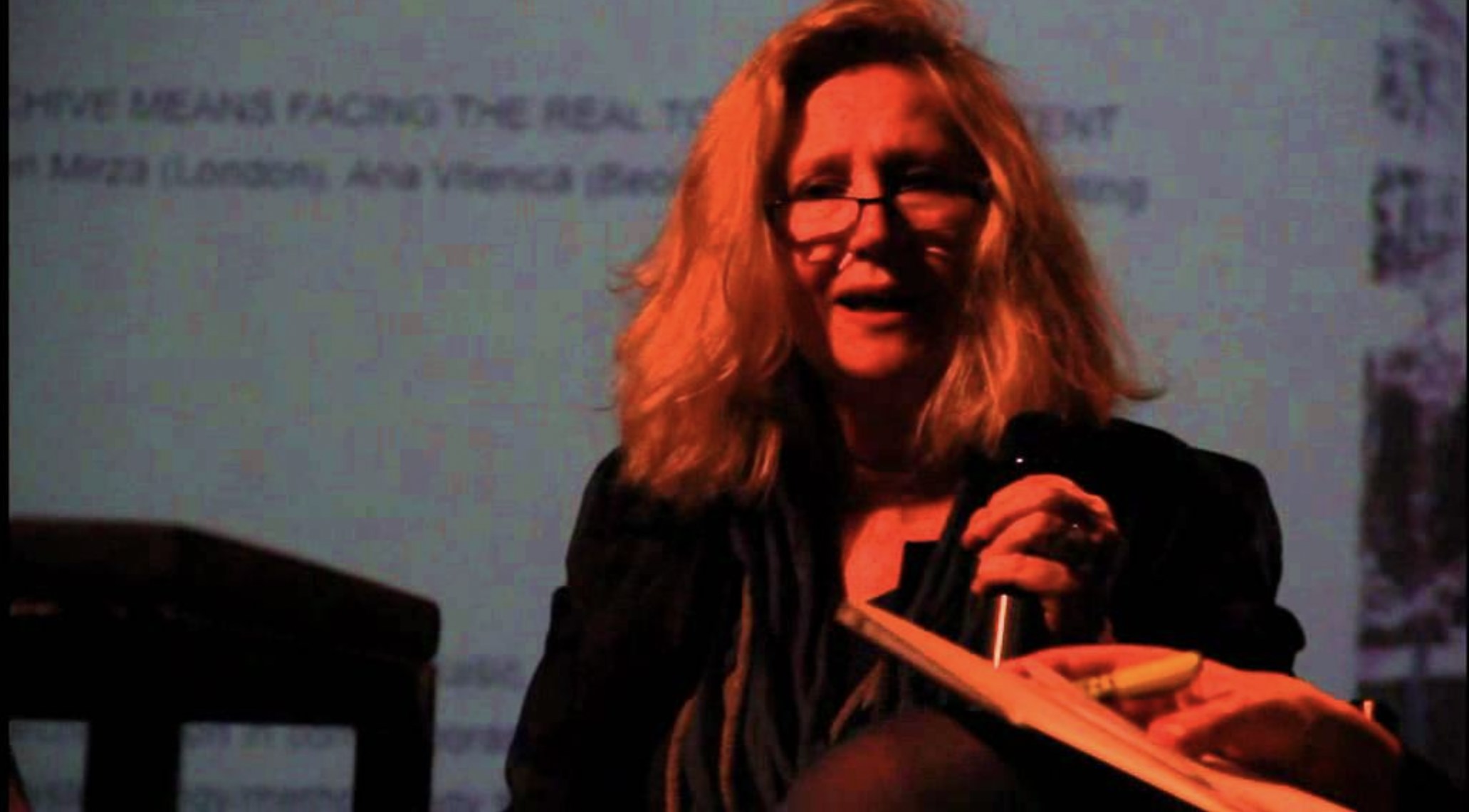
Biljana Kašić
It is interesting to see that some national myths that were very important for the constitution of national states such as national economic brands or national currency disappeared over two or three decades, and very quickly we lost our national sovereignty, especially financial sovereignty. There are a lot of articles by Croatian and international economists explaining how rapidly we became a kind of new colony, the country of newly 'discovered' resources for western investors. I fully agree with the stand of famous postcolonial theorist Gayatri Chakravorty Spivak[1] who said that foreign capital became a mobile subject with its own indisputable right. The capital that has arrived in Croatia was not designed either for local people or for the national economy. In addition, public sectors such as the medical system, social care and education have been increasingly devastated along with everything that is supposed to be our commons.
One of the consequences of the capitalist transition is the increase in migration from Croatia to the western countries, particular during the last decade. Right now half a million of young people with their families have migrated in foreign countries since they have no hope, they have no illusions, and they don't like the path of our country. And that makes me really sad.
Thus I think we should have a kind of Left imaginary once more, in order to both preserve young people in the country and to create a better future. Of course, there are people from the Left and the Green Left both from the parties and civil society who along with the feminists have started to articulate 'future agenda' how to stop capitalist devastation, how to reinvent, and how to preserve our commons, how to affirm the idea of „degrowth“. So, it is a kind of hope.
You mentioned immediate reaction to the war as one of the challenges. What was this immediate reaction of the feminist movement, and also the international feminist movement, and how did it evolve later?
A lot of feminist groups around the world immediately responded to our appeals or took their own initiative in order to support us. The support was humanitarian and humanist, concrete and psychological. Also, many pacifist groups like War Resisters' International from London, and many others small local organisations and people, like anarchists from Spain and Italy, were of support. Some of them just came and stayed to be with us, and did all that is needed including counseling us, offering workshops, and being our channels of communication. They disseminated our information and appeals all over the world. It is important to say that the communication channels with other parts of Yugoslavia were immediately cut off at the very beginning of the war.
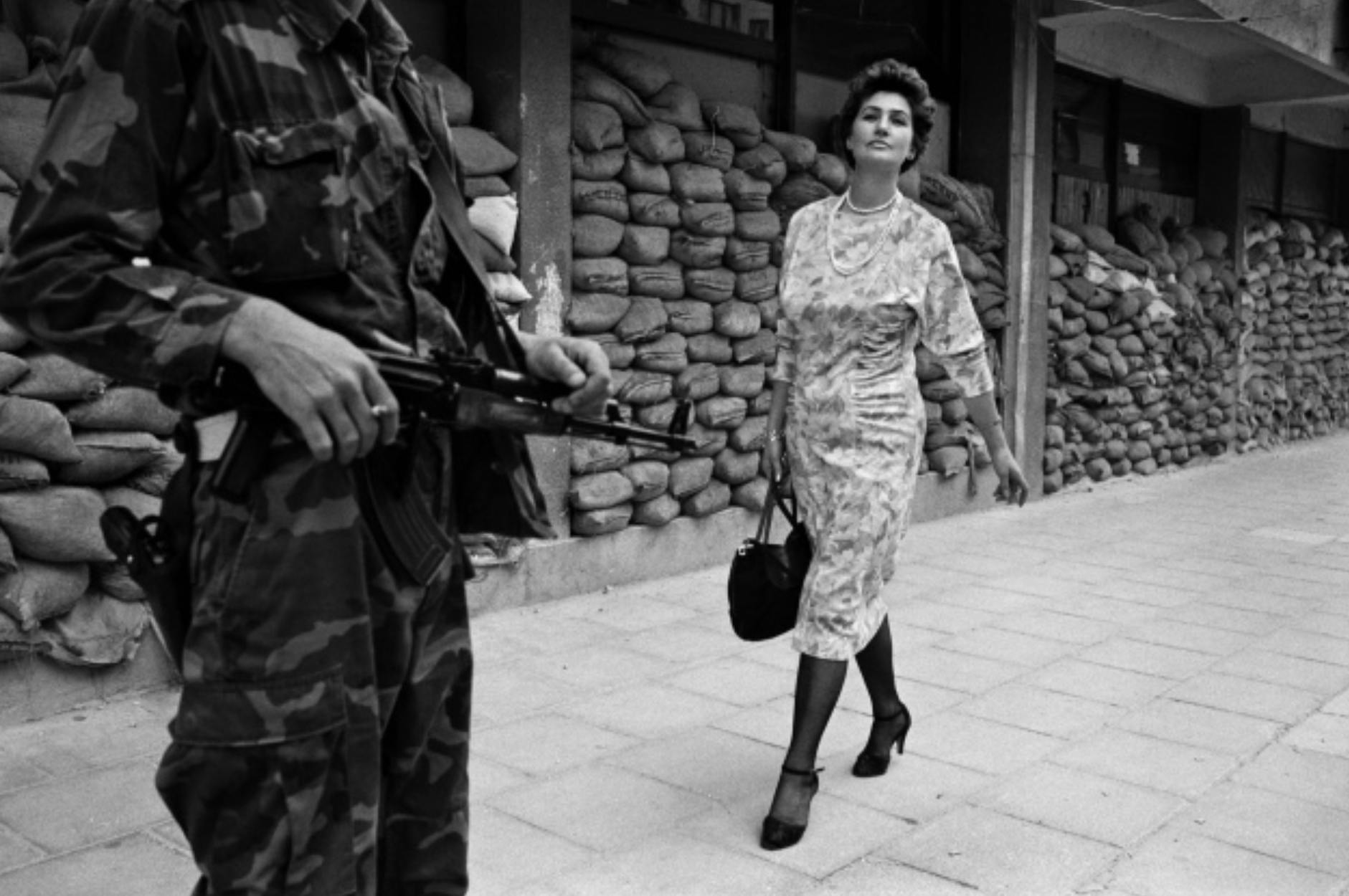
A woman heads to work during the siege of Sarajevo, Bosnia, 1995. Photo: Tom Stoddart
Feminist groups from other countries who came, supported us in various ways especially through strengthening and enlarging feminist networking. I do think that feminist solidarity was important - it was a way we could survive these atrocities and war havoc. A topic of rape as a war crime mostly against women is the first example that showed how the feminist solidarity worked at international level. Since 1992, when the first reports about the war mass rape against Bosniak women (namely, muslim women) came to us, all feminists from Croatia and Serbia along with the Bosnian women's groups were organised in order to support victims of rape. This issue was put immediately on the international level and there was an incredible response via offering medical and psychological help, counseling and also political support.
I’m very proud that in a very short time we raised this appeal and call for action. We felt international feminist solidarity immediately, and that feminist joint action matters. I recall how we organised our feminist channels for some raped women from Bosnia to come to Croatia, and then we helped them for sake of their safety to change their identity and to go to the third countries. All this was organised in a silent and subversive way, by respecting their privacy and enabling them a new life abroad.
And one of the most prominent examples of international feminist support came later on through the organisation of the first Women’s Court for feminist justice that was set up in Sarajevo in 2015.
Though international feminists were very supportive, I don’t think that they understood everything we did, everything concerning our positions and our contexts. Probably it happens to you too: most of the feminists from abroad don’t understand what it’s all about in Ukraine right now. In our case they were supportive for two reasons, I think: one is embedded feminist solidarity beyond war lines as our agenda, and other one is the fact that it was actually the first war is in the midst of Europe [since WW2]. Unlike wars in Africa or Central America, this one was closer to the feminists from the West. They could come to us, they could see what we were doing and somehow they felt that they had to respond to this very war.
We also faced a lot of solidarity by leftists, although some leftists didn’t understand what happened to us. They had the fixed 'dream of Yugoslavia' as a kind of lived utopia. When we were in Berlin in 1991, as part of a feminist peace 'tour' in Germany we met a lot of leftists who were very nostalgic about Yugoslavia, and they could not accept the reasons for its collapse. Some of them also thought that the Serbian regime was the only one that could save Yugoslavia. We felt that we were not quite understood by them since for us Yugoslavia was not a matter anymore. Probably it happens also in Ukraine, when some nice and smart people want to project their own fantasies and their own experiences upon a situation here. And that is often a wrong approach.
Therefore, following the opinion of the decolonial theorist Mladina Tlostanova[2], I stand for geopolitical epistemology, contextualization and local knowledge in the approach to every war or conflict zone in the world. There are no simple comparisons, and the situations are incommensurable.
However, through cross-border feminist solidarity, we also became part of international feminist support for other women in conflict regions.When at that time as feminist activists from the former Yugoslavia went to Israel in 1994, we joined the demonstration organised by Israeli Women in Black group in order to support Palestinian women at the conflict border. A sense of belonging to the same international feminist community was very empowering for us. Then I met feminists from Israel, who spoke about themselves as resisting [occupation] and as 'occupiers' at the same time. Of course, they were 'occupiers' without their will. Could you imagine this ambiguity concerning self-identification? Identifying with occupiers and bearing the political responsibility of the state of Israel just by belonging to it? Then I thought: we - as feminists - could also challenge these presumed state's patterns, their motifs or expectations by being disloyal to our states, by crossing ethnic, national or war divides.
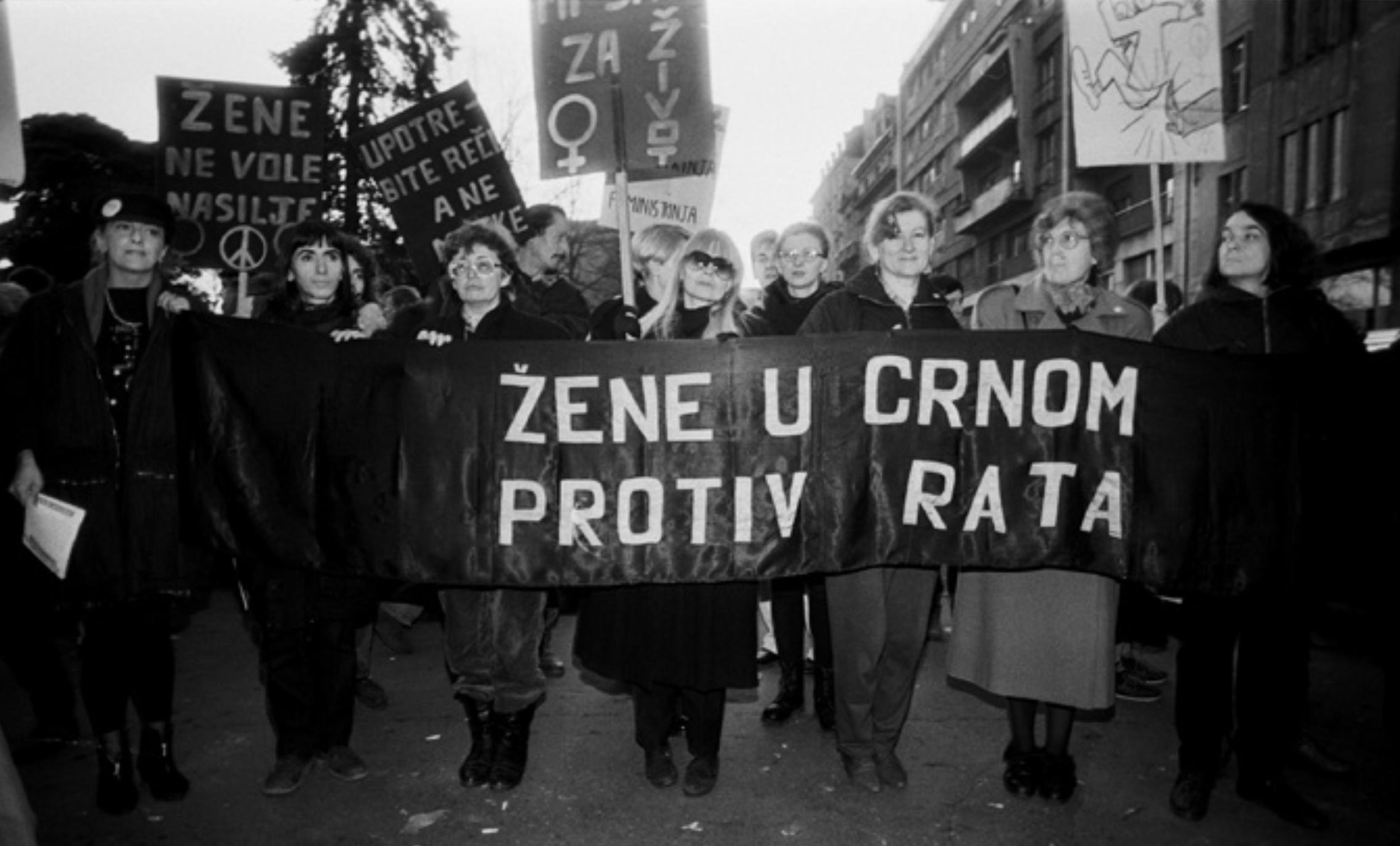
Women in Black, Republic Square Belgrade, March 1998. Photo: Vesna Pavlović
Modern radical feminist theory quite often reacts to war or any armed action as something man-ish, as a concentration of patriarchal violence with which women, or radical feminists, have nothing to do. What do you think about this claimnotion? And was this kind of position common at that time?
First, I don’t think that it’s only radical feminism that puts emphasis on manhood as a matrix of gender construction that’s supposed to create military men. We have to be very attentive in articulating this issue. Of course, any war violence, namely war conflict, is gendered. War also performs its operations mostly through gendered roles, whether we like it or not. Otherwise, why should men in general be in the possession of their own states, their own nation when the war happens, why if it is not a heteronormative decree from the patriarchal state? And there is also a kind of hidden and different agenda for women, within any wartime. Not all women are peace-loving — it’s also one of those stereotypes similar to ‘all men enjoy going to the army.’ Beyond this kind of paradigm of aggressor-victim, that women should behave like this, and men should behave like that, we have to articulate another, liberating position for men and for women, beyond the paradigm of coerced manhood or womanhood.
I do think that it’s not only about women and men, or archetypes they must supposedly follow: it's more about the current power constellations. It is about the capitalist interests dynamics of key international political actors, their goals or possible spheres of influence. The experiences of the countries of South America, Central America or Africa, bear witness to this. Namely, you precisely know what it’s all about — this kind of particular interest by some former colonisers, who wouldn’t easily give up on their recent colonies. They’re still there, through neocolonial regimes or mechanisms thanks to conjunction with the local national elites. And global political actors, of course. When we are trying to understand the situation in these respective countries, it’s also about old and new imperial fantasies accompanied by ongoing intentions of aggressors or war masters. On the other hand, looking at up-to-date history, particularly after the Second World War, there are many national liberation movements and decolonial struggles all over the world in South America, Central America, Africa, Asia, and so on. We have to consider that, too. It isn’t productive to speak about any war conflict as an isolated phenomenon; there are so many elements we have to take into account.
Talking about war, there is also the ethical aspect that touches on human violence among human beings and against each other, as well as on war destruction and human suffering. ‘Who can actually dare to ask me to kill another being, a human being, even if I take the right position in terms of war sides?’ is one of these sort of ethical queries. That's how we come to this PTSD syndrome very easily. For me, it is at the same time an extremely complex and very basic issue: how to deal with each other. One could say ironically that killing other human beings is a kind of the most intimate human touch. Or is it about the death of civilization based on necropolitical desire, if we could continue to kill each other? When we are thinking about the war, we have to take these dilemmas into account, too.
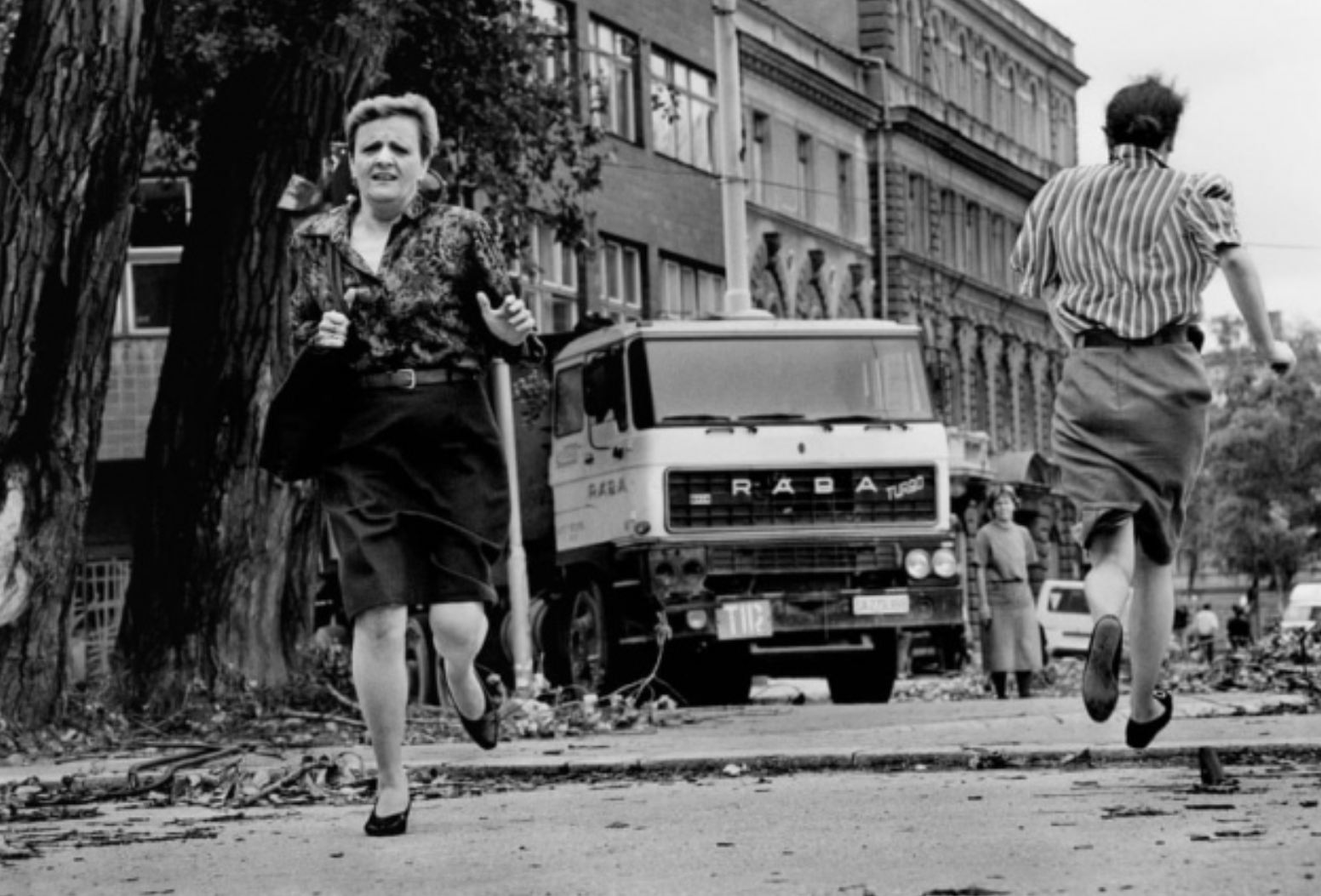
Women run down Sniper Alley, escaping from shelling, siege of Sarajevo, 1992. Photo: Wikimedia
Philosophers like Emmanuel Levinas, Jacques Derrida, and Étienne Balibar have dealt with these issues. And the famous feminist thinkers like Judith Butler or Sylvia Marcos from Mexico or Corinne Kumar from India, and many others. We shouldn’t be afraid to speak about these uncomfortable questions, even if we defend our country, even in the midst of the war conflict. In Croatia some war defenders, for example, committed suicide after the war unabling to overcome post-war trauma or anxiety connected with facing atrocities and killing another human beings. It happened in the United States after the Vietnam War, we know a lot about it. It happened after any war. These are ethical dilemmas and they search for humanist and human responsibility to deal with them.
We also have debates in feminist circles in Ukraine on whether it’s okay to make people go to the frontline, just based on their gender. What were the debates in your country during the war?
Any war sharpens this gender division to the greatest extent, that’s a problem. This is how it works in a heteronormative world, creating these kinds of paradoxes and orders. In Serbia back then, feminists and peace activists dealt mostly with dissidents of war, those refusing to support their own state to attack other countries, like Croatia or Bosnia Herzegovina. In Croatia, we dealt with consciousness objectors, those who despite knowing that we were victims of aggression didn’t want to be part of the military. Along with religious, ethical reasons matter.
And going back to your previous question, it’s not about radical feminist theory here. It’s about how societies function. Unfortunately, they function through binary gendered norms. And where is a place for lesbians and gays within this framework? Where is the place for queer people within the binary opposition? We can say abstractly that we are going to overcome binary oppositions. When you come to this kind of harsh reality, though, nobody asks you whether you are queer or gay. If you are a man or perform as a man, you have to serve in the military, you can’t cross the border, etc. You can perform that you are the other gender, but your name and surname position you within this particular order. This is a kind of hypocrisy, a little bit, even by queer feminists. At that moment what we did as peace and feminist activists was to offer our support to these guys, and many anarchists were among them, who explicitly said: ‘Hello, I don't want to serve any state.’
We have quite a contradictory situation when on the one hand, we as women and feminists, have to oppose these conservative tendencies within our society, the conservative tendencies reinforced by the war. But then on the other hand, we're also part of this Ukrainian resistance against imperialist aggression, and we're part of this resistance which involves various people and groups, including right and far right. We're constantly facing this contradiction. Was there anything similar back then in your situation?
There are so many paradoxes and open dilemmas that feminists have to deal with all the time. In so-called peaceful times, and in wartime as well. If we can say that feminism is a resistance movement, how can we then follow any national agenda, or the national agenda of any state? Since national state, in general, functions through a gendered regime that feminists oppose.
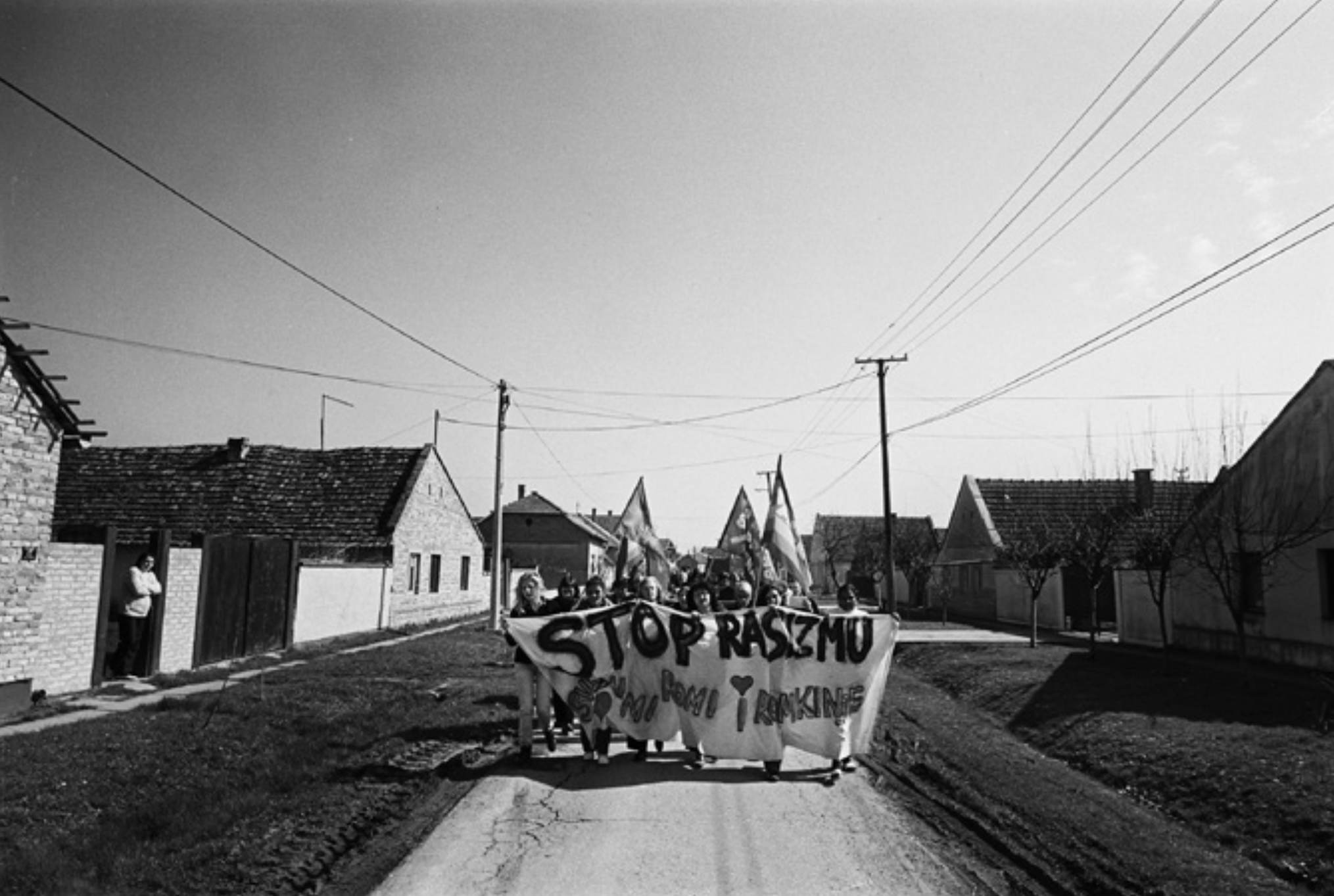
Women in Black, 'Stop Racism againts the Roma Population' march, Novi Bećej, March 23, 2011. Photo: Srdan Veljović
It’s very interesting, this kind of paradox itself. As feminists, we are also committed to resist and speak counter conservative aspects of the national politics of our state. Even if we follow national politics under specific circumstances such as state defence, we have to speak about it openly instead of subjecting ourselves to any kind of censorship, or waiting for the war to end. It is always a kind of trap, even intractable. One example from the history: during the Second World War, when women who were part of the antifascist movement, would say: ‘It will be a time after to speak about our liberation or women's human rights — since now we’re going to liberate our country,’ that very moment they gave up on themselves as women's agency, and their future.
We hear it all the time in Ukraine now.
You see. I do think that the brave feminists could challenge those conservative trends even in unfavorable times such as wartime. Because through this, they empower themselves and prepare an agenda for their work after the war. If we don’t allow ourselves to speak until the war is over — who knows, maybe we won’t speak at all. I am unfortunately not familiar with Ukrainian politics and their conservative or nationalist features.
Going back to the wartime in the former Yugoslavia we dared to deal with certain uncomfortable issues, and that's why the split happened among us as feminists. The question was whether we are going to be loyal to our feminist agenda, or whether we should be loyal to our national politics or our national state. This type of ultimate commitment was a dilemma for some of us, of course. It constituted a deep abyss among us, I have to say, and it was very painful. Some of the Croatian feminists thought that it wasn’t a proper time to continue talking with feminists from, for example, Serbia, because they should, first, apologise to us since they belonged to the aggressor state and they should take responsibility for, or be quite clear about their own position. On the other hand, why should the Serbian feminists be guilty for the actions of their political leaders, why should we treat them as our enemies? I'm sorry that this explanation is somehow reductionist because 'taking sides' during the wartime is always much more complex.
So, I’m not going to give any kind of recipe now — there is no recipe. What we learned about our feminist position is that we always have to think about the context from where we speak. And I’m pretty sure that your context is totally different from ours back then.
We constantly try to study the experiences of the post-war reconstructions in other countries, and we try to criticise the plans that our government publishes. How did the post-war reconstruction look in your case — in terms of justice and injustice?
It is a difficult and complex question. And it’s very interesting to me because we never thought about it during the war time. It was one of the postponed issues. But you are thinking about it now!
In terms of fair and just reconstruction, certain questions tackle the issue of the economy. Namely, the brutal and agonal so-called transition from socialist modernisation to a capitalist system was covered by democracy. Whatever ‘democracy’ means. We faced very quickly the loss of jobs, industrial devastation and the invasion of foreign capital whose consequences on people's lives were enormous.
Some questions related to the war such as war trauma, missing people, and war crimes are still present today. After three decades we didn't solve many cases connected with war crimes as there is a hidden agreement not to speak about war crimes that were happening from the so-called “our”, Croatian side. Some feminists have protested against it by insisting that we should face war crimes committed by the Croatian soldiers although we were mostly victims in terms of war facts. Apart from these issues we have been also facing historical revisionism. It is a tough issue.
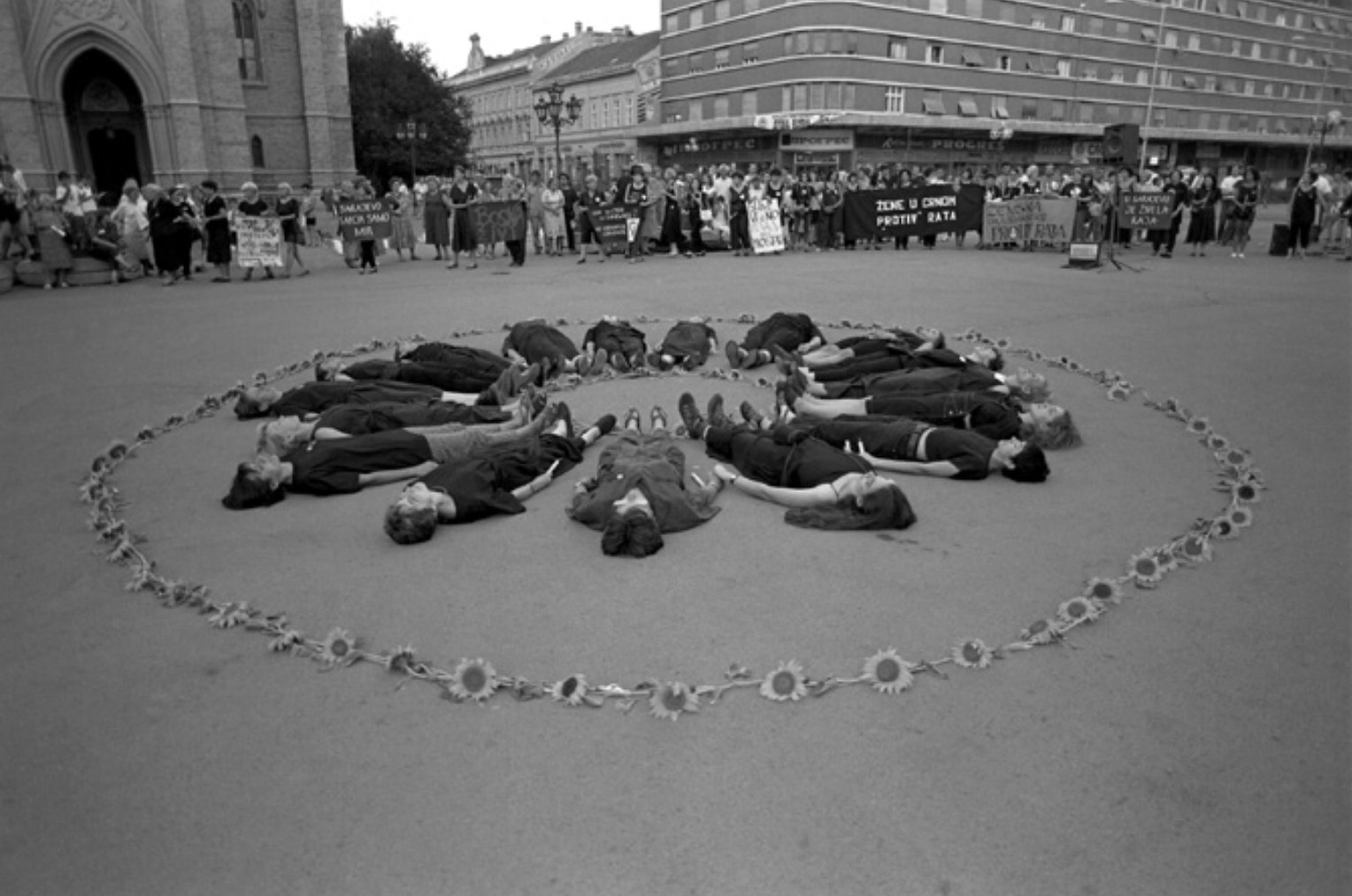
The Circle, the Third International Conference 'Network of Women's Solidarity Against War', Novi Sad, August, 2004. Photo: Vesna Pavlović
How can we then create a just reconstruction when there are still many war issues that deserve to be solved? And some political parties put those issues on the agenda all the time, for their own interests: ‘We're not going to speak with people from Serbia since there are a lot of our missing people, and they don’t want to cooperate with us on war crimes…’. Although in Croatia there are different ethnic minorities, the Serbian minority is somehow still denounced or negatively characterized. What is really interesting is that the Serbian minority has always taken a role within the leading political coalition and the Croatian government. So, you see, sometimes real interests are very much covered or masked by certain national interests.
However, the process of normalisation is going on, and when you look at Croatia from the outside, it seems a pretty stable and nice democratic country. But actually, as I said, the post-war reconstruction was brutal in many aspects, followed by criminal and non-transparent privatisation, neo-liberal economic regime, and systematic dispossession of the country’s material resources by foreign corporations. Of course, this would not be possible without the links to local politicians.
The main implications of this so-called transition are sharp economic inequalities among people, and the enrichment of a few, alongside capitalist devastation and deindustrialisation. And also right now we can speak about extreme precariousness and poverty. In the last few years for the first time I can see people in the capital city, Zagreb, sleeping outside — there are no shelters for them. This is what we have to demask the neoliberal turn that took place. Somehow we turned to be a country for neocolonial move, as a whole post-socialist Europe, a new 'discovery' place for foreign corporate investment. On the other hand, our country is a popular tourist destination. When I go to see my sister who lives in Split, a coastal city, — it’s like visiting a different state. People there are so much richer than in the east, close to the Serbian border. There is extreme regional inequality in Croatia. So we have different concepts of understanding transition, even within Croatia. Those who are relatively rich don’t care about poor people or about, for example, the precarious situation of textile workers, and many of them are women.
As I've already mentioned, half a million young people, due to the unfair political and economic surroundings, have migrated to other European countries that promise a better future. They went there with their whole families. We didn’t have such a huge emigration during the first two decades after the war, and even during the war! It's not even about economic issues. It’s much more about disappointment in the country and its leaders, about corruption and losing hope that it will get better.
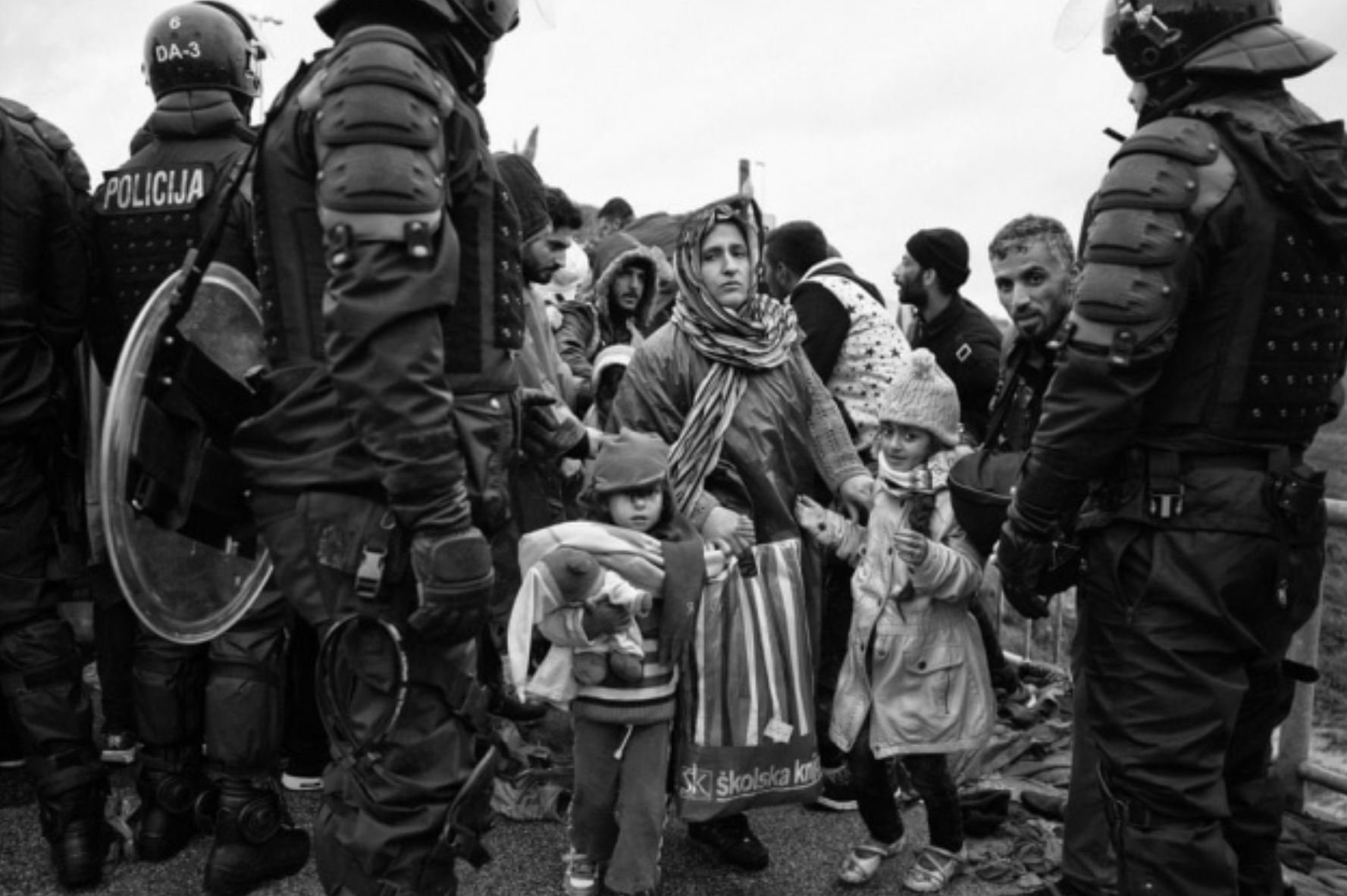
A mother leads her children through a Slovenian police line at the Timovec border crossing with Croatia, 2015. Photo: Wikimedia
Some young people, on the other hand, are trying to do something, to change certain things within the Croatian framework. A few years ago, they set up left-wing parties, such as the New Left (Nova ljevica), the Workers’ Front (Radnička fronta) or green-left ones such as We Can (Možemo). That’s a kind of hope. Those parties emerged from progressive civil society and grassroots initiatives, including feminist ones. People who decided to stay in the country and to do something, they said: ‘Finally, it’s time to enter mainstream politics because otherwise, we can't achieve anything. We tried a lot to do on the grass-root level, but our voice was not heard. So, we can't change the paradigm of politics if we are not going to be involved within the mainstream politics itself. Which is, of course, a dirty place, we know everything about, but we have to make some kind of compromise in order to change things, to move forward.’ What is a kind of feminist success in Croatia, is that just two weeks ago, thanks to the pressure of feminist initiatives, of feminists who participate in the left parties, the government finally decided to put femicide within the Croatian law and acknowledge femicide as a crime that has to be within criminal law. This is something.
Was there a perspective of gender-balanced post-war reconstruction?
Here, I would like to highlight two moments. First, due to accession to the European Union in 2013, Croatia had to integrate gender mainstreaming politics into every field of its acting, including laws and appropriate legal measures, and establish gender mainstreaming bodies such as ombudswoman for gender equality, committees for gender equality at national and local levels and so forth. That also means integration of gender perspective in all spheres of life — in politics, education, culture, economic field, etc. Although the whole process in this regard started almost twenty years ago by introducing the Law on Gender Equality and was enhanced by the adoption of the Life Partnership Act in 2014, many things in the direction of gender equality should be done. The second thing I would like to highlight is that, despite all these measures, the social reconstruction is not gender-balanced at all. There are, for example, about 32% of women representatives in the Croatian parliament while at a high position in the sectors of finances or IT, women make up less than 10%. Women are not present where power and money are. The gender gap is evident along with the fact that already feminised professions such as education, for example, are underpaid, etc. The situation is even worse when we come to the textile industry and the precarious positions of female workers.
When we talk about education there is no sex/gender education, either at the secondary school level, or at the university level. Instead of having a whole integrated gender studies curriculum at university we have certain courses or modules concerning feminism or gender identities, etc. I really hope that it will change soon.
However, I think, gender equality in terms of substantial equality means transforming the material conditions of human lives of all genders. In that sense there’s no change. Gender equality on this level is one long-term struggle in Croatia but elsewhere.
Over the past decade, same as you, we have been facing neoconservative tendencies, namely retrograde 'push'. It's like a kind of udar. You know what I mean? Blow. There are ‘pro-life’ organisations such as ‘In the Name of Family’ whose activities really threaten gender equality and our achievements. What they do, it’s scary – with unpredictable but dangerous consequences. They are powerful with reliable resources, very well connected, they are part of well-organised Catholic networking across the world. They manage to mobilise thousands of young women and men. I'm especially angry because they consume our time and energy, among other things. However, we have to struggle against their actions all the time in order to save reproductive rights including a right for safe and legal abortion, or enhance pro-choice politics for all genders. So, a lot of struggles we are now dealing with. It is not easy to be a feminist at all.
Footnotes
- ^ See: Spivak, Gayatri Ch. (1999). A Critique of Postcolonial Reason: Toward A History of the Vanishing Present. Cambridge. Mass.: Harvard University Press.; Spivak, Gayatri Ch. (2011). An Aesthetic Education in the Era of Globalization. Cambridge, Mass.:Harvard University Press.
- ^ See: Tlostanova, Madina (2018).What Does It Mean to Be Post-Soviet?: Decolonial Art from the Ruins of the Soviet Empire. Duke University Press.
